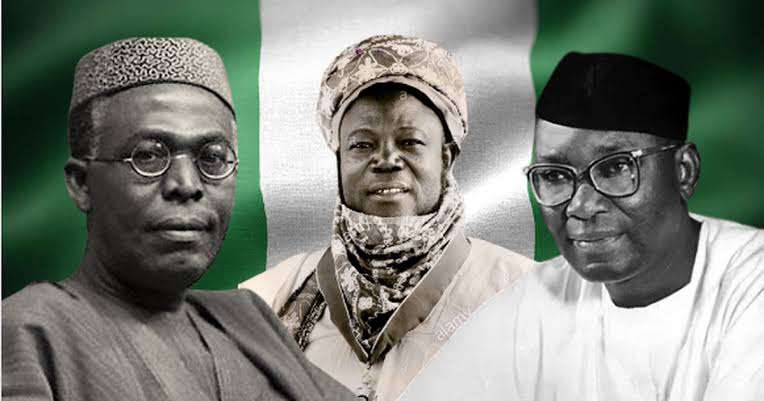Arts & Books
Book Review: Fifty Years of Nationhood? State, Society and Politics in Nigeria (1960-2020)

Title: Fifty Years of Nationhood? State, Society and Politics in Nigeria (1960-2020)
Co-Editors: Solomon Akinboye, M.M. Fadakinte.
Pagination: 399
Publishers: Concept Publications
Year of Publication: 2010
Reviewer : Adebayo Obajemu
Solomon Akinboye and M.M. Fadakinte co-edited this highly analytical, and penetrating selection of scholarly essays x-raying Nigerian transition from promise of greatness at the dawn of independence to despair fifty years after, national peregrination marked by betrayal of hope despair, pointlessness, rudderless leadership at different stages of our national life.
When the country gained independence from her British lords in 1960, the prospects of greatness loomed large in the minds of the founding fathers.
But fifty years into the journey of nationhood as at 2010 when the book was published and now 64 years on, despite so much natural and artificial endowments, the prospects appear elusive.
What went wrong? How can the situation be remedied?
As its contribution to national discourse on the Nigerian project, the Department of Political Science, University of Lagos on 15-17 June 2010 organised an international conference entitled: “50 Years of Nationhood? State, Society and Politics in Nigeria.1960-2010.
With opening remarks by the erewhile governors of Lagos State, Asiwaju Bola Tinubu who is now President of Nigeria and Babatunde Fashola, SAN, the conference afforded eminent academics and outstanding political scientists, such as professors Okwudibia Nnoli, Onigu Otite, Eghosa Osaghae, Solomon Akinboye and others the opportunity to bare their minds on the problems and challenges of nationhood and proffer suggestions for moving the nation forward.
The talkshop covered such issues as the leadership imperative, the national question, the challenges of nationhood, religious intolerance, ethics and accountability, violence in politics, corruption, ethnicity and the challenge of national integration, foreign relations, political economy and rent seeking and the prebendal nature of our warped politics.
Without doubts, the aggregation of these thoughts, which formed the basis of the book, will go along way in putting us back to the path of national reawakening in order to define, determine and locate, where the rain began to beat us to paraphrase Chinua Achebe, and the nature of the rain.
As stated in the book, the crisis of nationhood started too early arising from the primordial sentiments and the fault lines that widened our differences with only few points of convergence.
In the piece entitled: “Nigeria at 50 and the Leadership Imperative delivered by President Bola Tinubu, who was then referred to as former governor of Lagos State, he assiduously dissected with a clinical efficiency and exactness of a Swiss watch, the problems of leadership confronting the nation, highlighting progressive mantra of true federalism, state policy, good governance, rule of law, equity and democracy. For many Nigerians, this may seem the tyranny of irony as 14 years after this great speech; Bola Tinubu is now the president doing the very opposite of his positions enunciated in his University of Lagos address.
So, the challenge of leadership is still ongoing with the nation becoming worst for it.
On account of poor leadership and governance system, the promising country at independence in 1960 has today become a caricature of a nation unable to conduct free and fair election, feed her citizens and provide other basic social services like education, electricity, health and security.
As its now, Nigeria is now faced with soaring unemployment, unprecedented insecurity, poor quality of life, hunger, while the political class brim with life in luxury and conspicuous consumption without contributing anything to the discourse and efforts to recover the country from the miasma same political class has mired the country in.
Eminent scholar, Professor Eghosa Osaghae discussed the concept of fragile state, which has gained currency in development discourse since the 1990s. He says that a fragile state is characterized by lack of capacity to discharge the functions traditionally associated with states and serve as driving agents of development.
Eminent sociologist Onigu Otite took a look at Nigeria at 50, periodizing it into three eras, viz: the First Republic, 1960-1966; the period of diarchy, 1977-1999, and the eleven years of undisturbed civilian rule,1999 to date.
He described the first era as time of the P, when Nigerian leaders were patriotic nationalists and anti- colonial fighters for one Nigeria. This set of Nigerian leaders, he said, were socialised in their indigenous societies from where they brought high doses of morality, accountability, transparency and brotherliness.
He has harsh word for the second and third sets. Other scholars attempted a brilliant dissections of the Nigerian question, the Nigerian conundrum, offering solutions.




